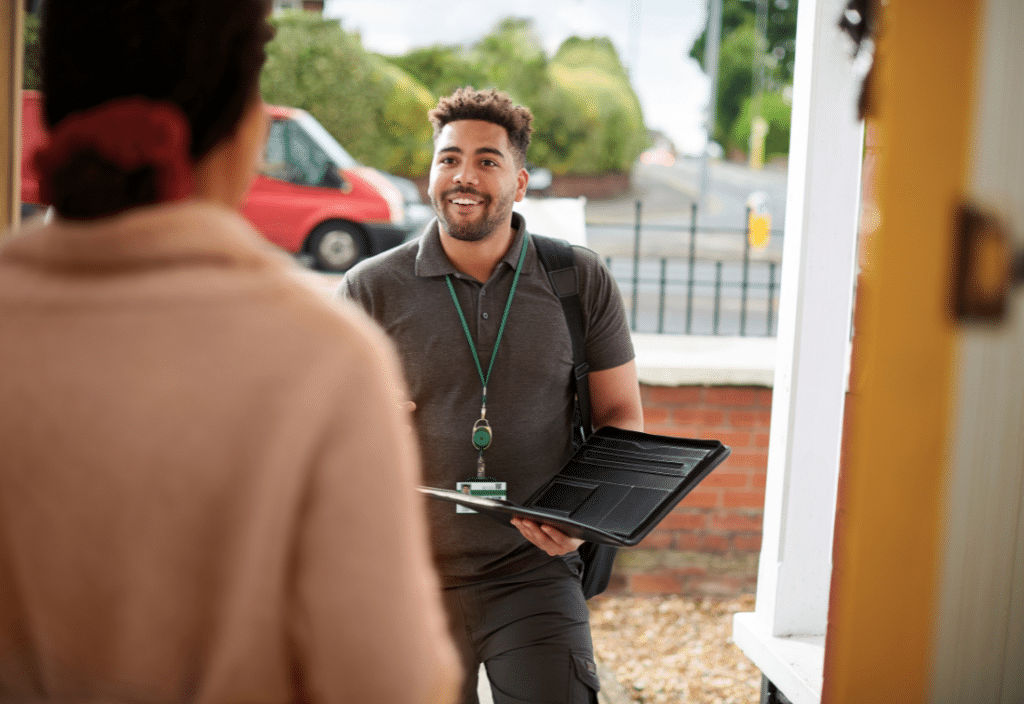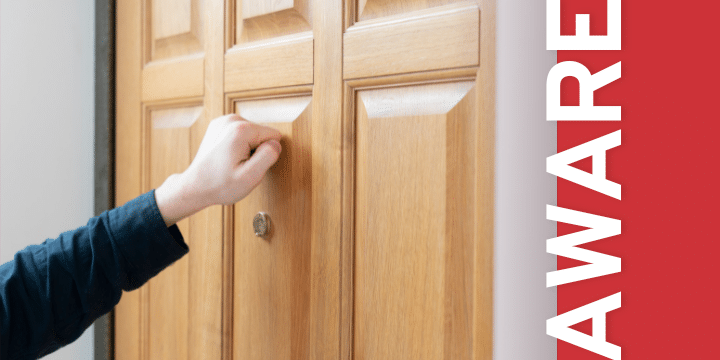With the warm weather in full swing, it’s no surprise that door-knocking campaigns have become more prevalent in our neighborhoods. While most of these campaigns are harmless and well-intentioned, it’s important to be aware that they can also be exploited for scams. However, we wouldn’t want to see you turn away genuine organizations or even miss out on some Girl Guide cookies out of fear of schemes. We’ve gathered some essential tips to help you navigate these situations and decipher the scams from legitimate efforts. By staying informed and cautious, you can ensure your safety while still supporting worthy causes and enjoying a cookie or two.
Door Knocking Scam
What To Be On The Lookout For
Deceptive Sales Pitches
One common strategy employed by door knockers is posing as sales representatives offering seemingly legitimate products or services. They may claim to sell home security systems, energy-efficient upgrades, or magazine subscriptions. While some of these offers might be genuine, it’s crucial to remain skeptical and thoroughly vet the individuals and companies they represent. Don’t fall prey to persuasive sales pitches without proper verification.
Home Inspection Scams
Another tactic used by door knockers is offering free home inspections. They may falsely claim to represent utility companies, home improvement contractors, or government agencies. In reality, their intention could be to identify vulnerabilities in your home’s security or gain access for nefarious purposes. Always verify the credentials of anyone claiming to be a home inspector before granting them entry. Contact the relevant organization directly to confirm their legitimacy.
Phishing For Information
Door knockers may engage you in casual conversation to gather personal information or gain insights into your daily routines. They may ask seemingly harmless questions about your neighborhood, work hours, or living arrangements. However, this information can be used to exploit your vulnerabilities, plan burglaries, or perpetrate identity theft. Be cautious and avoid sharing sensitive details with strangers.

How To Protect Yourself and Your Home
1. Install a Peep Hole or Doorbell Camera
Having a peephole or doorbell camera installed adds an extra layer of security to your home by allowing you to visually verify the legitimacy of individuals before opening your door. Doorbell cameras, available in both wired and wireless options, offer high-definition video capabilities that can be linked to your smartphone, enabling you to see and identify visitors in real-time from anywhere. With motion detection and two-way audio features, these cameras act as a powerful deterrent and provide convenience and peace of mind. Whether it’s deterring potential intruders or capturing valuable evidence, a doorbell camera is a valuable investment in enhancing your home security.
2. Ask For Identification
Always request identification from anyone claiming to represent a company or organization. Legitimate professionals will carry identification badges or business cards. Take the time to verify their credentials by contacting the company directly or researching online. Never solely rely on the identification shown by door knockers.
3. Don't Make Hasty Decisions
Door knockers often employ high-pressure tactics to create a sense of urgency and push you into making hasty decisions. They may offer limited-time deals or claim that exclusive discounts are available only if you sign up immediately. Remember, reputable companies will give you time to research, compare prices, and make an informed decision. Don’t let urgency sway your judgment.
4. Report Suspicious Activity
If you encounter a suspicious door knocker, it’s crucial to report their activity to local authorities. Provide as many details as possible, including their physical appearance, identifying features, or the vehicle they were using. By reporting such incidents, you help law enforcement track patterns and protect your community from potential dangers. You can report scams through the Canadian Anti-Fraud Centre.
Staying vigilant and informed is key to protecting yourself from deceptive door knockers. By being cautious, verifying credentials, and installing security measures, you can enhance your home’s safety and avoid falling victim to scams. Remember, it’s your right to prioritize your security and make informed decisions when dealing with door-to-door interactions.

